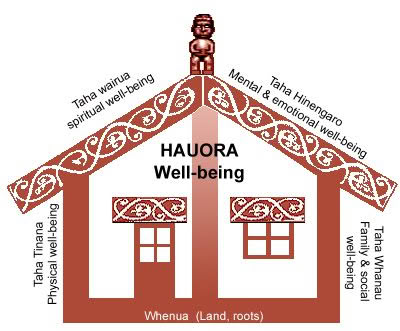What is spirituality
Spirituality means different things to different people. It may include (a search for) one’s ultimate beliefs and values; a sense of meaning and a purpose in life; a sense of connectedness; identity and awareness; and for some people, religion. It may be understood at an individual or population level.1
For Māori, the terms ‘wairuatanga’ or ‘wairua’ are used to speak of the spiritual dimension and things pertaining to the spirit of an individual or living being (as in the ‘wairua’ or spiritual essence of each living thing). However, whilst these terms are used by many Māori they are often not well understood by much of New Zealand society. Wairuatanga can be viewed as being interrelated to everything and as a fundamental aspect of health and wellbeing. Values, beliefs and practices related to wairua are considered an essential cornerstone of Māori health and well-being. 2

Spirituality is an integral part of wellbeing. In the NZ context Te whare tapa wha describes the four pillars; te taha whanau (the family), te taha hingaroa (the mind and emotions), te taha tinana (the physical aspect) and te taha wairua (the spiritual dimension).
Spirituality involves acknowledging and nurturing the uniqueness of each person. Dimensions of spirituality are complex and can be expressed in a number of ways.
Spirituality is about;
- Hope and strength
- Trust
- Meaning and purpose
- Forgiveness
- Belief and faith in self, others, and for some this includes a belief in a God/deity/higher power
- People’s values
- Love and relationships
- Morality
- Creativity and self-expression
Spiritual care is not;
- just about religious beliefs and practices
- About imposing your own beliefs and values on others
- Using your position to convert
- A specialist activity
- The sole responsibility of the chaplain
Suggested prompt questions that may help begin your conversation with patients, their relatives or carers;
- What matters to you most?
- How have you made sense of the challenges and stresses that have occurred in your life?
- What are the most important things to you in life?
- Which faith or spiritual practices are important to you?
- Are you part of a community that offers support?
- Who or what gives you strength at this time?
- Who brings you comfort?
- What is giving you the most anxiety at the moment?
- What memories are troubling you?
- Would you like to talk about those?
- Who can bring you a sense of peace with those?

General recommendations when taking a spiritual history:
- Consider spirituality as a potentially important component of every patient’s physical well being and mental health.
- Address spirituality at each complete physical exam and continue addressing it at follow- up visits if appropriate. In patient care, spirituality is an on-going issue.
- Respect a patient’s privacy regarding spiritual beliefs; don’t impose your beliefs on others.
- Make referrals to chaplains, spiritual directors or community resources as appropriate.
- Be aware that your own spiritual beliefs will help you personally and will overflow in your encounters with those for whom you care to make the doctor-patient encounter a more humanistic one.4
1 Egan, R, MacLeod, R, Jaye, C, McGee, R, Baxter, J, & Herbison, P. (2011). What is spirituality? Evidence from a New Zealand hospice study. Mortality, 16(4), 307-324. doi: 10.1080/13576275.2011.613267
2 Moeke-Maxwell, T. (2013). In Spirituality and Well-being: Discussion Paper, Spirituality and Well-being Strategy Group 1.
3 Royal College of Nursing. (2011) Spirituality in nursing care: a pocket guide. London.
4Puchalski, C.& Romer, A. (2000). Taking a spiritual history allows clinicians to understand patients more fully. Journal of Palliative Medicine, 3(1), 129 – 137.

